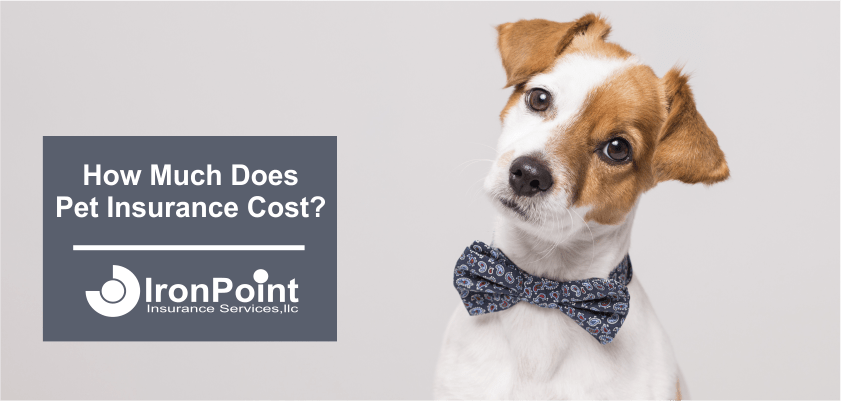How Much Does Pet Insurance Cost?

You’re bringing home a new pet, and you have a few questions. Should I get pet insurance, and what does pet insurance cost? Well, the reality is that the cost of pet insurance varies based on several factors. Things like your location, the type of pet you want to insure, and the breed and age of your pet all play a part in determining the cost of pet insurance. But the big driver of the cost is going to be the amount of coverage you want to buy. It’s better to invest in pet insurance earlier in your pet’s life to keep your premium cost low and to ensure your pet is eligible for the type of plan you want.
How much does pet insurance cost on average?
Pet insurance may be more affordable than you think. In reality, most people can purchase a policy for only a few hundred dollars each year. The cost is even better for cat owners, as their costs are typically less expensive than dogs. Regardless, of whether you own a cat or dog, the cost will vary largely on the type of pet health plan you buy.
What do we mean?
Well, most pet insurance companies will offer pet owners two types of plans: accident-only and comprehensive. If you select an accident-only plan it will generally cover such things as car accidents or poisoning and will have significant savings compared to comprehensive plans. This is because comprehensive plans will cover both accidents and illnesses.
Let’s help you better understand how much pet insurance costs. Below is a small breakout of common pets along with the average cost for a plan.** As you can see there is a pretty wide range of costs. This is based on differences in states.
- A common house cat (Domestic): $161.16 – $386.28 per year
- Small breed dog (Yorkie): $239.76 – $574.56 per year
- Medium breed dog (Beagle): $368.16 – $882.24 per year
- Large breed dog (Labrador): $398.64 – $955.20 per year
Sample plans are based on an unlimited annual limit, a $250 annual deductible, and 90% reimbursement. All pets were assumed 2 years old. Quotes are all based on an annual term.
Is buying pet insurance worth the cost?
For many, just knowing that a pet insurance policy helps prepare you for an unexpected pet illness or injury that can turn into expensive veterinary bills makes it worth the cost. Sure, some pet health issues are not costly and can easily be handled by most budgets. However, this is not true for major health issues or accidents. For instance, some major issues or surgeries can cost thousands of dollars. Since we don’t have a crystal ball to consult about our futures, having the right insurance protection in place helps provide peace of mind in the event the unforeseen happens. This is true for your home or auto insurance, and it’s true for your pet as well.
How does pet insurance reduce your vet costs?
It’s important to note, pet insurance doesn’t reduce the cost of the actual veterinary bill, rather it can reduce its impact on your budget. When you purchase pet insurance, the plan you select will reimburse you for a percentage of your out-of-pocket costs, minus your deductible. During your pet health insurance quote, you will be able to select your deductible and reimbursement amount. Reimbursement options are typically offered in increments of 70%, 80%, and 90%. Additionally, you will also want to make sure you have selected the appropriate annual limit, you may be offered ranges between $5,000 and unlimited. If you select a lower limit, and your veterinary expenses exceed that limit, then you will be responsible for the amount over the limit. So, for most pet owners pet health insurance is worth the cost, and it’s customizable for most budgets and the pet owners’ tolerance for risk.
What factors affect pet insurance rates?
Each insurance company is a bit different, so we will provide you with some general items that affect pet insurance premiums. First, the amount of coverage you select is going to have a significant impact on the premium, the more you buy the more you’ll pay. However, there are several other factors that affect your rate regardless of the amount of coverage you select or the company you’ve elected.
The following five (5) factors commonly affect pet insurance costs:
1. Where do you live
Like many other products and services, veterinary care simply costs more in some states and cities than others. For instance, the cost of veterinary services in rural cities is often different than in major metropolitan areas. So, your location is going to be a factor in determining the cost of pet insurance.2. The age of your pet
Just like with people, as your pet gets older the likelihood of illness or injury increases. This can mean higher vet costs. Whenever the probability of costs is higher, generally speaking, the cost of insurance premiums is higher. As a result, the cost of pet insurance generally goes up as your pet ages.3. The breed of your pet
Certain breeds of dogs and cats may be predisposed to certain illnesses. These illnesses are based on size and genetics. For example, Abyssinians are a very expensive cat breed to insure. This breed is predisposed to periodontal disease and retinal atrophy, leading to higher vet costs. For dog breeds, larger dogs are more vulnerable to heart and hip issues, leading to higher veterinary costs. So, in short, your pet’s breed can impact your pet insurance premium.4. The deductible or reimbursement options selected
It’s worth repeating, the more coverage you choose the higher the cost of pet insurance. So, selecting a higher deductible will lower the premium for your plan. It also increases your out-of-pocket costs for veterinary expenses. Conversely, a lower deductible increases your plan premium, but you’ll reduce your out-of-pocket vet expenses. Additionally, the level of reimbursement selected also affects your premium. It makes sense, a plan with a 90% reimbursement amount costs more than a plan set to 70%, you’re getting more coverage. Adding wellness options will also increase your premium, but may provide value that is worth considering when buying pet insurance.5. Pre-existing conditions
When you buy a pet insurance policy, some insurance carriers may require an examination. That’s not the case with our partner, Pets Best. Even if your pet insurance doesn’t require an exam, pet insurance companies won’t cover pre-existing conditions and certain illnesses. Some past conditions that were cured may be covered, but that’s not certain. When you purchase a pet insurance policy it is a good idea to check with the insurance company you choose to make sure any condition your pet may have, or had, is covered.Pro Tip: Pre-existing conditions, serious injuries, and unexpected emergencies are all handled differently based on the insurance company and type of policy you choose. Reference your policy to determine what is covered, your out-of-pocket costs, and your level of reimbursement.
Get pet insurance today
Online
Get a pet insurance quote from IronPoint Insurance Services and our partner Pets Best.
Call a rep
Call 1-877-334-7646 and speak with a representative.
*5% discount applies to BestBenefit plans; discount not available in AK, FL, HI, or TN. Additional 5% discount if insuring more than one pet.
**Information compiled June 2018 from Pets Best data and petsbest.com.

Quote & Buy Pet Insurance
Start a Pet Insurance Quote today. IronPoint Customers can save 5%.
Give us a Ring
1-877-334-7646
Call today and speak with a professional insurance agent.